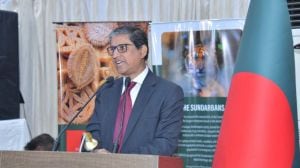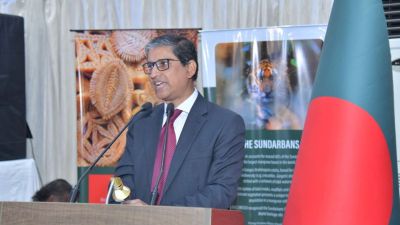Underlining the need to “encourage the use of local languages in courts” since a large section of the country’s population “finds it difficult to understand the judicial process and rulings of the court,” Prime Minister Narendra Modi said Saturday that such a move would help the common man relate to the judiciary.
In subsequent remarks on the Prime Minister’s suggestion, Chief Justice of India N V Ramana said it cannot be done “suddenly” but “over a period of time, I think, it will happen.”

“This is a serious issue… It will take some time… There are lots of hurdles, bottlenecks, hiccups in the implementation of regional languages in High Courts,” he said.
Union Law Minister Kiren Rijiju, who was present at a press conference with CJI Ramana, while responding to a query from The Sunday Express, said: “We are very positive towards encouraging use of local languages in the judiciary. It’s a process which requires wider consultation with the judiciary. For usage of languages in the court, not only for arguments, but also for orders, judgments, we require the approval of the Chief Justice of India. That is why it needs wider consultation, and we will definitely have very positive consideration in this matter.”
While lower courts function in local languages and English, the High Courts and Supreme Court use English in their proceedings.
Speaking at the inauguration of the 11th Joint Conference of Chief Ministers and Chief Justices of High Courts, Prime Minister Modi said: “A large population finds it difficult to understand the judicial process and rulings of the court. There is a need to simplify this and make it accessible. We just encourage the use of local languages in courts. This will ensure that the common man has faith in the judiciary and can feel part of the system.”

Earlier, CJI Ramana had highlighted the need for some courts to conduct business in local languages. The Prime Minister endorsed the idea but said it will be a while before it actually happens.
Story continues below this ad
“I am glad the Chief Justice of India mentioned having High Courts using local languages. It will take a long time for that, but it will improve access to justice. Why can’t medical and technical education be done in the mother tongue? Some states are already doing it,” he said.
Stressing on the importance of access to justice, Modi said the government is working towards simplifying laws passed in Parliament for the common man to understand them.

“Along with the actual legislation, if a simplified version is also passed in Parliament for the common man to understand, then he will not have to go to the court for interpretation of the law. The government is studying this issue,” he said.
Underlining that a majority of undertrial prisoners in the country are poor or from ordinary families, he appealed to states to release them on bail wherever possible.
Story continues below this ad
“Human sensitivity has to be at the heart of these things (status of undertrials). There are over 3.5 lakh prisoners in jails today who are undertrials. A majority of these are poor or from ordinary families. There is a committee in every district headed by the district judge to look into this issue and wherever possible bail must be granted to them,” he said.
 Yogi Adityanath interacts with Mamata Banerjee during the meet. (Express Photo: Praveen Khanna)
Yogi Adityanath interacts with Mamata Banerjee during the meet. (Express Photo: Praveen Khanna)
“I appeal to all Chief Ministers and Chief Justices of High Courts to prioritise undertrials on the basis of humanitarianism and the law,” he said.
He asked states to identify and repeal obsolete laws to improve the ease of living of citizens.
“In 2015, over 1800 laws were identified as obsolete. The Centre has repealed over 1450 laws while states have only repealed 75 laws. Since all the Chief Ministers are present here today, I appeal to you to identify these laws and repeal them. People are stuck in outdated legal regimes and if you repeal them, it will benefit citizens,” he said.
Story continues below this ad
Invoking a vision for the future of the judiciary, he urged the Judges and Chief Ministers to set the vision for the nation in 2047, when India would celebrate 100 years of independence.
“Integration of the judiciary with Digital India is very important. As we adapt to Digital India even in villages, citizens will have similar expectations from the judiciary too,” he said.
He also highlighted that despite the pessimism, India has adapted to a digital economy, and transactions even in villages now happen online.
“About 40% of all digital transactions in the world happen in India. This India will expect the same speed from the judiciary,” he said.
Story continues below this ad
Newsletter | Click to get the day’s best explainers in your inbox
Later at a press conference, CJI Ramana, speaking on the suggestion for use of local languages in court proceedings, said there have been demands for allowing use of regional language from states like Tamil Nadu. He said recently a senior politician had also mentioned Gujarat, but he had not received any representation.
“As of today, Hindi is the medium of language in most states… Earlier, a request came, if I remember, when I joined the Supreme Court… That was rejected by the Full Court of the Supreme Court. Thereafter, no concrete proposal came before the Supreme Court asking for allowing regional languages. Recently, this regional language issue has started. It has not reached… It has to come from various levels to the Supreme Court… It will take some time… There are lots of hurdles, bottlenecks, hiccups in the implementation of regional languages in High Courts,” he said.
“The reason is sometimes some of the judges are not familiar with the local language. The Chief Justice will always be from outside. The most senior judge will also sometimes be from outside. Secondly, we don’t have that much technology or systems to translate the entire record to the local language or local language to English. And logistics support is the biggest problem in implementing this. To some extent, artificial intelligence is some way out,” he said.
Story continues below this ad
Referring to efforts by former CJI S A Bobde and Justice Nageswara Rao, the CJI said: “To some extent it materialised… going into the other intricacies requires some time. Definitely, I hope that in the future, technology will take care of this… In one day, suddenly we cannot implement any reform or anything… Over a period of time, I think, it will happen.”

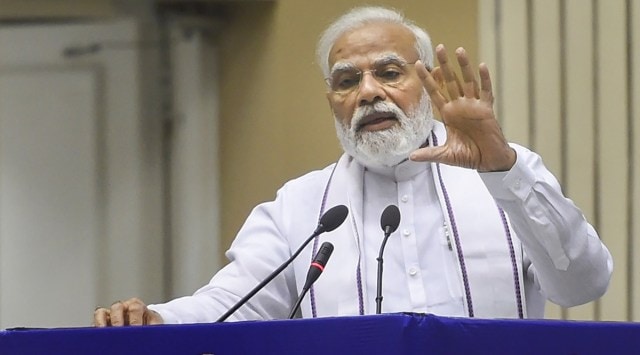

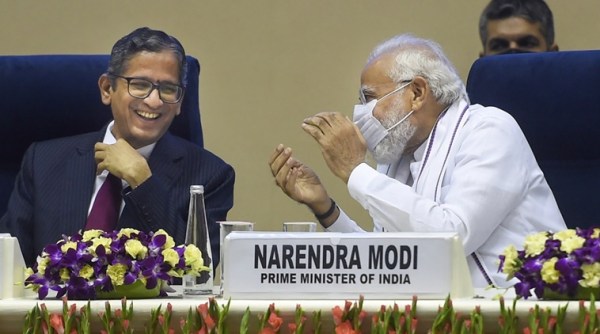
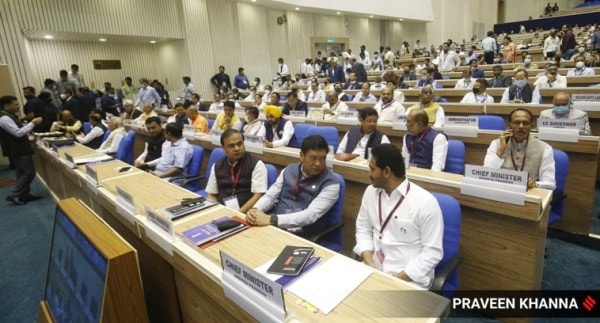
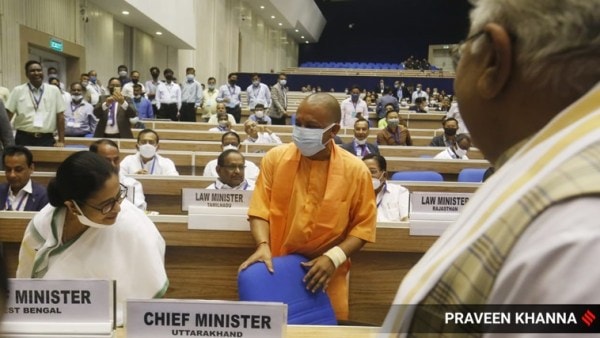 Yogi Adityanath interacts with Mamata Banerjee during the meet. (Express Photo: Praveen Khanna)
Yogi Adityanath interacts with Mamata Banerjee during the meet. (Express Photo: Praveen Khanna)

